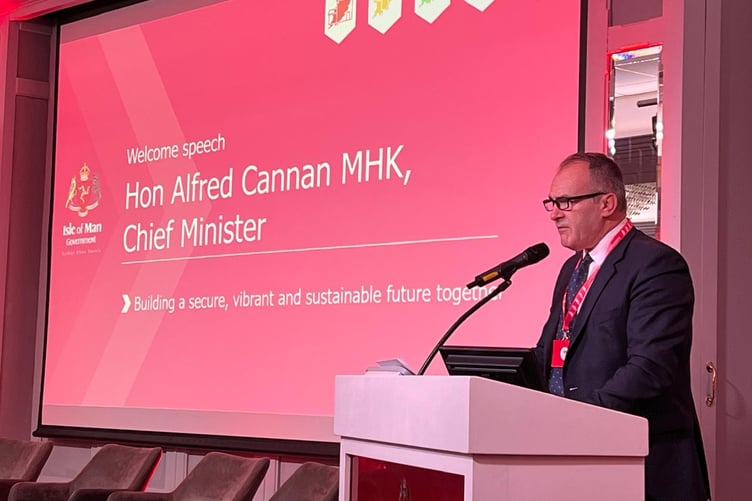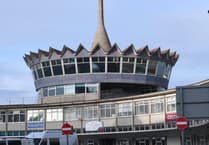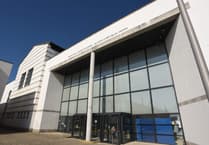The Chief Minister has set out new measures on security, immigration, housing and the economy in his opening speech at the 2025 Government Conference.
Speaking at the start of the two-day event in Douglas today (Tuesday), he said the island faced ‘ever increasing challenges’ but stressed government’s focus on security in the past year had been the right approach.
He confirmed the government is considering requiring passengers to carry identification when travelling through the island’s ports, despite limited checks under Common Travel Area rules. Ports officers have already been merged into the Isle of Man Constabulary and work is under way on facial and number plate recognition technology.
On immigration, he announced higher minimum salary thresholds, a new healthcare surcharge, and tighter rules for dependent routes. A single service will be created to handle both immigration and work permits, alongside plans for mandatory registration of all new workers and residents.
Housing was described as a continuing challenge. Since the start of the administration, more than 1,300 new homes have been approved, with over 160 units now under way. The Chief Minister pledged to revise the First Time Buyer scheme this year by increasing salary thresholds, raising purchase price limits and expanding support for open market purchases.
He also confirmed the removal of the cap on apprenticeships for large employers and highlighted the need to prepare for the impact of artificial intelligence. A new national AI Office for Development, Regulation and Security will be set up before the end of the year to coordinate government and private sector responses.
Alongside this, the island’s economic strategy will be updated to reflect global changes. The Department for Enterprise will lead the work, with input from businesses through an advisory board.
The Chief Minister said government had faced challenges including the pandemic, cost of living crisis and war in Europe, but had invested in housing, healthcare, education and air connectivity.
He added: ‘The future is not fixed. It is shaped by the choices we make today. And together, we will ensure that our Island thrives in the world that is emerging.’
The Chief Minister’s opening address in full:
I would like to welcome you to the fourth Government Conference and thank you for your interest and engagement in participating and listening to the detail, explanations and analysis of government policies that will take place over the next two days.
Thank you also in advance to our external speakers, particularly James Pomeroy of HSBC and island resident and entrepreneur Jim Mellon, who will both be giving an independent view of the economic challenges facing the globe and, by extension, the Isle of Man during the conference.
I also know that Jim Mellon will be announcing a new investment platform in the island supporting new technologies. I am grateful to Jim, as I am to all our business leaders who put the island at the forefront of their thinking, and I look forward to hearing more detail tomorrow.
This conference takes place at a time of heightened global tensions. Last year at the conference I said how uncertain and volatile the world felt, how rising knife crime and riots had sent vibrations through Westminster, and how the word ‘secure’ in our secure, vibrant and sustainable vision needed to become very much the central focus of the next twelve months.
This year, as we approach the end of this administration and look towards the next, you will hear much of the continued journey we have been on over the last four years, what we have accomplished in the last twelve months, and also hear about some important and urgent changes in emphasis as we respond to the ever-increasing challenges around our island.
Tomorrow, the Minister for Justice and Home Affairs will update you on what we have done to tighten our security and empower our agencies to protect and secure our island over the past twelve months. We will also update you on what we are going to do to further ensure that the Isle of Man remains as free as possible from serious and organised crime, and why we are now having serious conversations regarding the requirement to carry identification when travelling through our ports.
As it stands, the Common Travel Area rules provide limited border checks, but that does not mean we cannot implement some form of requirements both to carry and to check identification, even if that is on a risk-based basis.
Our focus over the past twelve months on security has proven correct. In February we merged Ports Officers into the Isle of Man Constabulary and we continue with our plans for facial and number plate recognition technology. These are often the unseen efforts of Home Affairs and policing, but they are vital not just to protect our people, but to grow and develop our reputation as a secure and stable place to live and work – a place where sometimes we forget that we and our families can enjoy our island and live in a relative safety not available to others. We should not take this for granted.
This feeling of safety and freedom is, I would suggest, a strong contributory factor as to why estate agents and tax consultants are reporting a significant upsurge of interest in the island from UK residents. We will not stop our efforts over the next twelve months to protect our security in a world that presents a multitude of risks to our economic and physical safety.
Aligned to this theme is the focus on Moneyval and the vital assessment that will take place in October 2026. There has been exceptional effort across government and industry as we continue to strengthen our defences against increasing financial crime. It will remain a priority over the next twelve months as we must pass this assessment, recognising the high standards we already have in place and improving our processes where needed.
I also spoke last year about immigration and the work we would be doing to tighten up our processes to thwart those who seek to abuse the system. Whilst we have made some progress, there remain concerns. Last month I convened a high-level meeting including senior officers and the Chief Constable to understand more about the checks and balances we were applying to businesses seeking to recruit skills from outside the Common Travel Area, and the data available on immigration.
It is clear that we have more to do. This year, not only are we raising minimum salary requirements for immigration and imposing a healthcare surcharge, we will also be looking to raise our thresholds further for dependent routes that offer limited economic value to us.
In continuing to tighten up, we must be aware of three key points:
- Skills are still needed in certain areas to contribute to our economy.
- We must be mindful of the economic value brought by new residents to our shores, as well as the social cohesion our island enjoys.
- Those on visas who break our laws will have their visas terminated.
To aid these aims, we will also be merging our work permits and immigration processes into a unitary service for employers, with stronger controls and oversight. This will represent a single front door for those coming to the island to work and will give us greater insight and oversight over employment of both foreign nationals and workers from within the Common Travel Area.
We also intend to move towards a mandatory registration requirement for all new workers and residents on, or shortly after, arrival so we can have greater confidence in who is here and that they are legitimately here.
Housing remains a challenge. Since the start of this administration we have seen over 1,300 new dwellings approved and are on track to deliver against the original ambition of over 1,000 new homes occupied. The government has also supported delivery through the Manx Development Corporation and the Island Infrastructure Scheme, with over 160 units now under way, and continues to assess incentives to bring empty properties back into use.
Despite this progress, the need for affordable housing and the challenges for young people remain. It is also one of the difficulties in retaining and attracting the skills our economy needs.
We are therefore committing to substantially revising and improving our First Time Buyer schemes this year. We will increase salary thresholds, raise the upper limit on purchase prices and expand support for the Choice scheme which allows for purchases on the open market.
This will provide more opportunities for young families to access the housing market and will support developers with the confidence to increase supply. We will also complete our work on establishing a housing agency, continue to bring empty properties back into use, and work with local authorities to encourage new schemes.
It is also vital that we develop economic opportunities for young people. A skills strategy has been developed by a Skills Board bringing together industry, the Chamber of Commerce and government departments.
We currently have more employers than ever offering apprenticeships, but we recognise that some larger employers have pulled back. We will remove the cap on apprenticeships for large employers, meaning any qualifying business prepared to take on an apprentice will receive support.
We must also respond to new developments in artificial intelligence. Last week I hosted an AI summit involving leaders from the public and private sectors, on the same day Google announced a £5bn investment in the UK. It is clear that the capabilities of AI will significantly challenge the status quo.
Two actions must take place before the end of the year:
- A national AI Office for Development, Regulation and Security will be created to coordinate strategic thinking across public and private sectors.
- The island’s economic strategy will be revised to reflect the pace of global change.
The Department for Enterprise will lead the economic review, supported by a high-level advisory board, with input from the business community.
This government has faced exceptional challenges – a pandemic, cost of living crisis, damaging tribunals and war in Europe – yet we have worked steadily through it all, protecting business and people. We have invested in healthcare, built more houses, developed brownfield sites, introduced new quality assurance measures for education, invested in air traffic control and sustained air connectivity, and we now have more people in work contributing to our economy than ever before.
But we cannot take these foundations for granted.
Over the next two days you will hear more about these challenges and opportunities, and the steps your government is taking to continue to protect our way of life, defend our economic success and pave the way for continued sustainability, security and vibrancy.
The Isle of Man has always been resilient. From generation to generation, our people have adapted, innovated and taken opportunities even in times of uncertainty. Now, once again, we are called upon to look ahead and to act with purpose.
With a revised and refreshed economic strategy, a commitment to responsible innovation, and stronger safeguards for our community, we can ensure the Isle of Man remains a place of opportunity, security and prosperity.
The future is not fixed. It is shaped by the choices we make today. And together, we will ensure that our island thrives in the world that is emerging.
I want to thank you all for your support in helping us navigate our journey over the last four years, and I look forward to an engaging and important two days of discussion and debate to help us all shape the journey ahead.




.jpg?width=209&height=140&crop=209:145,smart&quality=75)